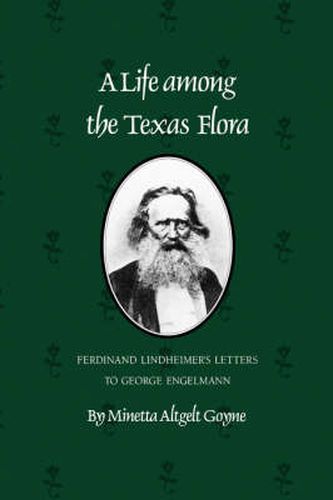Readings Newsletter
Become a Readings Member to make your shopping experience even easier.
Sign in or sign up for free!
You’re not far away from qualifying for FREE standard shipping within Australia
You’ve qualified for FREE standard shipping within Australia
The cart is loading…






This title is printed to order. This book may have been self-published. If so, we cannot guarantee the quality of the content. In the main most books will have gone through the editing process however some may not. We therefore suggest that you be aware of this before ordering this book. If in doubt check either the author or publisher’s details as we are unable to accept any returns unless they are faulty. Please contact us if you have any questions.
From an endangered species of prickly pear cactus to a daisy and even a snake, the name Lindheimer is tied to the nomenclature of Texas natives in nature. The name originally belonged to Ferdinand Lindheimer, one of the Southwest’s first serious scientists, who came to be known as the Father of Texas Botany. This immigrant from Frankfurt, Germany, spent more than a decade living on a shoestring budget as he searched the wilds of Central and Southeast Texas for new species. His correspondent, friend, fellow botanist, and fellow Frankfurt native was George Engelmann, who also served as Lindheimer’s conduit to civilization and to botanic circles worldwide. Like Lindheimer in the tangled prairies, Minetta Altgelt Goyne spent more than a decade on a difficult task: deciphering and translating more than forty of Lindheimer’s letters, contained in the Engelmann Papers at the Missouri Botanical Garden archives. Goyne’s biographical research and annotations make Lindheimer’s letters a fascinating window on his excitement in discovering new species and oddities and his frustrations with immigration politics and frontier life. His comments in his letters to Engelmann about the personalities and practices of the Texas German immigrants and their leaders are at times witty and biting. His wealth of experiences and pointed observations make this a story that will intrigue botanists, Germanists, historians, and Texans everywhere.
$9.00 standard shipping within Australia
FREE standard shipping within Australia for orders over $100.00
Express & International shipping calculated at checkout
This title is printed to order. This book may have been self-published. If so, we cannot guarantee the quality of the content. In the main most books will have gone through the editing process however some may not. We therefore suggest that you be aware of this before ordering this book. If in doubt check either the author or publisher’s details as we are unable to accept any returns unless they are faulty. Please contact us if you have any questions.
From an endangered species of prickly pear cactus to a daisy and even a snake, the name Lindheimer is tied to the nomenclature of Texas natives in nature. The name originally belonged to Ferdinand Lindheimer, one of the Southwest’s first serious scientists, who came to be known as the Father of Texas Botany. This immigrant from Frankfurt, Germany, spent more than a decade living on a shoestring budget as he searched the wilds of Central and Southeast Texas for new species. His correspondent, friend, fellow botanist, and fellow Frankfurt native was George Engelmann, who also served as Lindheimer’s conduit to civilization and to botanic circles worldwide. Like Lindheimer in the tangled prairies, Minetta Altgelt Goyne spent more than a decade on a difficult task: deciphering and translating more than forty of Lindheimer’s letters, contained in the Engelmann Papers at the Missouri Botanical Garden archives. Goyne’s biographical research and annotations make Lindheimer’s letters a fascinating window on his excitement in discovering new species and oddities and his frustrations with immigration politics and frontier life. His comments in his letters to Engelmann about the personalities and practices of the Texas German immigrants and their leaders are at times witty and biting. His wealth of experiences and pointed observations make this a story that will intrigue botanists, Germanists, historians, and Texans everywhere.